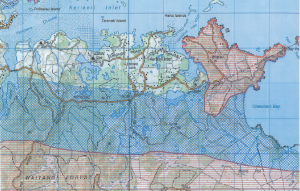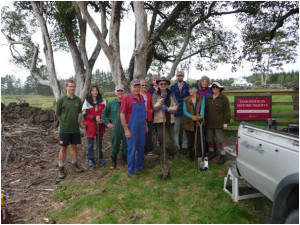
blue = low kiwi call area
red = high kiwi call area
A map showing the location of Northland brown kiwi populations irritated locals around the South Kerikeri Inlet so much they decided to take action.
The map showed kiwi present in many parts of Kerikeri, but absent from their patch. Hearing about the Kiwi Coast was the final spark needed to inspire residents to form the South Kerikeri Inlet Landcare (SKIL) Group.
Article by South Kerikeri Inlet Landcare
SKIL formed in May 2014, after seeing a Department of Conservation map showing that kiwi were found in many places around Kerikeri but there was a noticeable gap north of Inlet Road. We’d also heard about the Kiwi Coast, and the large number of community projects working together towards the goal of a kiwi corridor along Northland’s east coast.
A group of residents decided that we should get involved and focus on pest control to encourage the neighbouring kiwi populations to return to our patch.
Kiwi in Kerikeri
The Kiwi Coast helped the group to start, creating a flyer inviting local residents to meet, and facilitating our first meeting. About 30 locals came along and discussed ideas on what we could do to care for our local area. We displayed the kiwi map, which clearly demonstrated the problem. Everyone agreed that the successful natural return of kiwi into our area could be facilitated by ongoing animal pest and dog control by residents.The SKIL group was formed, and now meets approximately every three months, to exchange experiences and ideas.
The Northland Regional Council (NRC) were also immediately very supportive, with Biosecurity Officer Mike Knight assisting the group to apply to the Biosecurity E-Fund. This was successful, and around 160 traps of various types were distributed to landowners to set the ball in motion.
NRC delivered the traps for distribution to members of the group in November 2014 and trapping began in earnest. In the interim period before the traps were delivered, the Kiwi Coast and NRC held a Local Trapping Workshop for our group so we could learn about toxins and how to use traps safely. SKIL members were also encouraged to attend the Northland Regional Trapping workshop held by the NZ Landcare Trust at Waimate North in August 2014. By the time the traps were deployed to members there was a good understanding of how to use them effectively.
Edmonds Ruins Restoration

Another project taken on by the group, to encourage biodiversity, was to assist Heritage NZ in the restoration of the bush area surrounding the historic Edmonds Ruins. This bush area had been infested by mature privet which had recently been killed. In conjunction with Mita Harris of Heritage NZ, who funded the purchase of many of the plants, the SKIL group held two planting days, in August and September 2014, planting more than 100 puriri, 50 pohutukawa and a variety of other plants. Weeding has been ongoing and further plantings are planned in this year.
Trapping Results
Pest control trapping results are now in place and being updated quarterly. As can be seen from the tables below the numbers have been increasing as the traps are deployed and operated by residents. The total number of pests removed this year (2015) is already approaching the total for 2014:
Totals for 2014 – Possums 87; Rats 39; Mice 46; Stoats 3; Weasels 0; Feral cats 1; Rabbits 81 Myna birds 6; Hedgehogs 10 – Grand total 263
Totals for 2015 (to date) – Possums 89; Rats 36; Mice 23; Stoats 7; Weasels 1; Feral cats 2; Rabbits 45; Pigs 2; Hedgehogs 4 – Grand total 209
KIWI Listening
At the last SKIL group meeting, held on Sunday 12th April, DOC Kerikeri representative Steve McManus briefed the attendees on the intricacies of kiwi listening. Suitable kiwi listening sites are now being selected by landowners in order to establish a basic database of Kiwi distribution in our area. Steve also offered to provide some kiwi listening training, taking keen people with him on his regular listening sessions at Mount Bledisloe to show them how it should be done – and to confirm what a real kiwi sounds like!
Many thanks to Mike Thompson from SKIL for submitting this article. If your group would like to share news or a story with others in the Kiwi Coast please contact Ngaire, the Kiwi Coast Coordinator.


